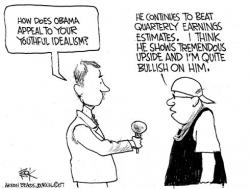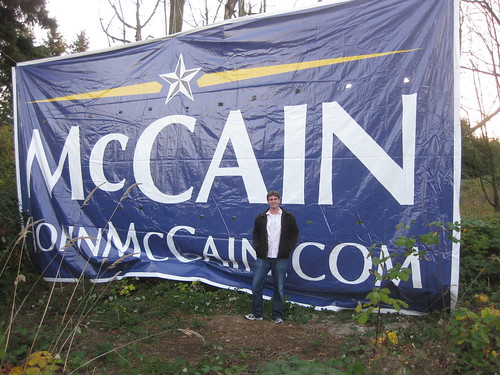This election, the NDP ran as good a campaign as it was possible to run under the circumstances. It was tight, well-scripted, logistically near-flawless and fully funded for the first time. They had a leader who, arguably, made fewer mistakes than the others (outside the occational skinnydipping dopehead) and reached out to people and places ignored by previous NDP campaigns.

The national NDP results were pretty good. The
party attracted 2,517,075 votes or 18.2% yielding 37 seats and 67 second places. Compare this to the 2006 general election where the party attracted 2,589,597 for 29 seats and 53 second places. And the budgets? $13,524,525 in 2006 compared to an estimated $20,000,000 this time.
But after spending almost 50% more money, or $6M, the party attracted a mere 8 additional seats and a relatively minuscule number of additional votes. And they never broke the 20% barrier.
Have they,
as one comentator put it, hit the orange ceiling?
It's time for the NDP to explore the idea that they have gone as far as they can under their current party structure. The question is Are theose in charge of the NDP is willing and able to pay the required price for greater success.
Can they cut the formal structural ties the party currently has with the Canadian union movement.
To put it another way: Would you vote for a party which reserves 25% of policy convention delegates to affiliated union organisations? Or would you vote for a party which reserves 25% of leadership convention delegates to affiliated union organisations? Yet that's standard operating procedure in today's NDP party.
Would you feel any better if 25% of your party's delegates came from the Canadian Chamber of Commerce? Or maybe the Quebec Major Junior Hockey League? Isn't one special interest group equivalent to any other?
Tony Blair, early in his tenure as leader of the Labour party faced this choice. He had the courage required to make fundamental structural changes to his party. He cut ties to the British labour movement and thus modernised his party to turn it into a real alternative to the Conservative party.
Is Jack Layton ready to do the same?
Which brings us back to the Unite the Left movement. This is a popular trope among casual political observers and the argument is a simple one: in order to confront the menace on the Right, the Liberal party and the NDP (and possible the Greens) must and should unite under one banner in order to prevent vote splitting.
After all, didn't Reform and the Progressive Conservatives successfully unite? Sure they did. And it took years of negotiations, talks and compromises to make ithappen. Couldn't the Liberals and NDP do the same?
In the long term, it's possible.
But Canada does not want or need the further polarisation of national politics between the hard-right to center-right umbrella that is the national Conservative Party on one side and a creature of the Canadian union movement on the other.
No responsible federal party should ever be as beholden to national organised labour as the NDP party is now.
If there is to be a true Unite the Left movement, the NDP will have to agree to shed it's formal union ties as a precondition to those talks.
 And that man was interesting, tall, bald, funny, realistic, fiercely partisan, always had a warm smile and was ready to chat anytime.
And that man was interesting, tall, bald, funny, realistic, fiercely partisan, always had a warm smile and was ready to chat anytime. The political repercussions are huge. Governor Bobby Jindal (R) has gone from national hero through his keen and prudent management of the Louisiana public purse to the goat scrambling to make ends meet torpedoing his national ambitions.
The political repercussions are huge. Governor Bobby Jindal (R) has gone from national hero through his keen and prudent management of the Louisiana public purse to the goat scrambling to make ends meet torpedoing his national ambitions. 






 As a quick and compact brand identity, you just can't beat the "O" logo. This showed up everywhere in many many forms. My bet is that it is already one of the most recognizable visual identities on the planet for a logo only three years old. The design was no accident.
As a quick and compact brand identity, you just can't beat the "O" logo. This showed up everywhere in many many forms. My bet is that it is already one of the most recognizable visual identities on the planet for a logo only three years old. The design was no accident. 
 He was up against another distinctive speaker, John McCain. McCain even branded his bus with his speaking style: The Straight Talk Express. In another campaign cycle, that phenomena would have attracted more comment. In this campaign cycle, that rhetorical device was swamped and overwhelmed in the face of the most effective orator in political generations. People will be writing and publishing articles and books on the Obama oratorical and rhetorical style, devices, origins, influences, accomplishments, effects and any other way you can analyze and break it down; count on filling a long shelf. But as a quick overview,
He was up against another distinctive speaker, John McCain. McCain even branded his bus with his speaking style: The Straight Talk Express. In another campaign cycle, that phenomena would have attracted more comment. In this campaign cycle, that rhetorical device was swamped and overwhelmed in the face of the most effective orator in political generations. People will be writing and publishing articles and books on the Obama oratorical and rhetorical style, devices, origins, influences, accomplishments, effects and any other way you can analyze and break it down; count on filling a long shelf. But as a quick overview, 



 I expect Obama to win. My
I expect Obama to win. My  A side story: I've been fascinated to see how the web has affected this campaign cycle in ways
A side story: I've been fascinated to see how the web has affected this campaign cycle in ways 






 One of my earliest political memories was the provincial election of 1972 when Frank Moores defeated Joey Smallwood. The local newspaper printed a score card of all the candidates so you could track the results at home as they came in on the radio. I remember sitting at the kitchen table, keeping track of the results on the scorecard until I was shooed off to bed. By the next morning, the political world of this province had undergone a seismic shift. Smallwood was gone and Moores was in.
One of my earliest political memories was the provincial election of 1972 when Frank Moores defeated Joey Smallwood. The local newspaper printed a score card of all the candidates so you could track the results at home as they came in on the radio. I remember sitting at the kitchen table, keeping track of the results on the scorecard until I was shooed off to bed. By the next morning, the political world of this province had undergone a seismic shift. Smallwood was gone and Moores was in.





 This video is worth checking out: it's a
This video is worth checking out: it's a 




















